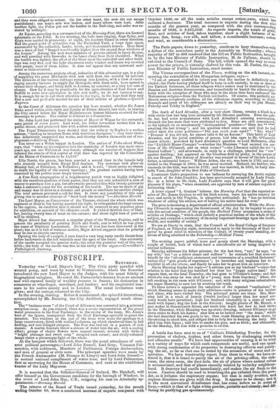The morning papers publish more gaol gossip about the Mannings,
with a couple of letters, both of which have a considerable air of being inspired by clerical influence.
Manning addresses his fellow prisoner, for the last time, "not," he says, "as my wife," but "as a fellow sinner and sufferer ": he reminds her that none can benefit by the " all-sufticient atonement and intercession of a crucified Redeemer," unless they "give proofs of repentance"; he beseeches and implores her to be truthful in all she utters; and finally he asks her to grant him an interview. Maria Manning begins her reply—" I address you as my husband "—since that relation is the bond that has banished her from her "happy native land." She repeats that, on the fatal Thursday, she had gone to O'Connor's house; and that while she was away he was shot by a "young man from Guernsey," whom she left smoking in the room with O'Connor; and, with many religious exhortations, she urges Manning to save her by avowing the truth.
i
To these letters is appended the substance of the repeated "confessions," to which Manning seems to make daily additions—some in presence of his brother and sister, who have visited him. The principal points are these. Mrs. Man- ning laid in a stock of brandy (twelve bottles) larger than her usual eco- nomy would have permitted; kept her husband constantly in a state of excite- ment with liquor; dug the hole in the kitchen; bought pistols of Mr. Blanch, a gun maker in Gracechurch Street, and made him teach her how to load them; on the Thursday, while Manning was op-stairs dressing, induced O'Connor to go down stairs to wash his hands ; shot him as he looked over " the drain," which she had described his own grave to be; then made Manning go down stairs, by threatening to shoot him, and obliged him to help her in burying the body. She plied him with liquor ; told him to smoke his pipe, and so forth; and ultimately, on the Monday, left him with a promise to return.


























 Previous page
Previous page